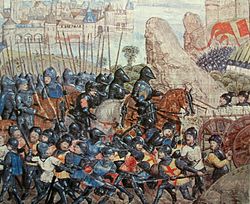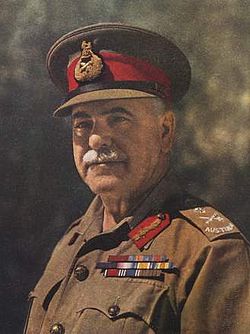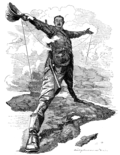Portal:History
The History Portal

Historia by Nikolaos Gyzis
History is the systematic study of the past, focusing primarily on the human past. As an academic discipline, it analyses and interprets evidence to construct narratives about what happened and explain why it happened. Some theorists categorize history as a social science, while others see it as part of the humanities or consider it a hybrid discipline. Similar debates surround the purpose of history—for example, whether its main aim is theoretical, to uncover the truth, or practical, to learn lessons from the past. In a more general sense, the term history refers not to an academic field but to the past itself, times in the past, or to individual texts about the past.
Historical research relies on primary and secondary sources to reconstruct past events and validate interpretations. Source criticism is used to evaluate these sources, assessing their authenticity, content, and reliability. Historians strive to integrate the perspectives of several sources to develop a coherent narrative. Different schools of thought, such as positivism, the Annales school, Marxism, and postmodernism, have distinct methodological approaches.
History is a broad discipline encompassing many branches. Some focus on specific time periods, such as ancient history, while others concentrate on particular geographic regions, such as the history of Africa. Thematic categorizations include political history, military history, social history, and economic history. Branches associated with specific research methods and sources include quantitative history, comparative history, and oral history.
History emerged as a field of inquiry in antiquity to replace myth-infused narratives, with influential early traditions originating in Greece, China, and later in the Islamic world. Historical writing evolved throughout the ages and became increasingly professional, particularly during the 19th century, when a rigorous methodology and various academic institutions were established. History is related to many fields, including historiography, philosophy, education, and politics. (Full article...)
Featured picture
Did you know (auto generated)

- ... that the radio program Radio City Music Hall of the Air employed approximately 10,000 musicians during the first eight years of its broadcast history?
- ... that Frederica Planta designed cards to teach the children of George III and Queen Charlotte the history of England?
- ... that the entire inventory of historic string instruments in Canada's Musical Instrument Bank are loaned to musicians in a competition held every three years?
- ... that some mill workers in a historic district in Virginia gave their ages as fourteen despite appearing much younger?
- ... that interviews collected for a Boston College oral history project were used in two murder trials?
- ... that Fairleigh Dickinson's upset victory over Purdue was the biggest upset in terms of point spread in NCAA tournament history, with Purdue being a 23+1⁄2-point favorite?
Malcolm X (born Malcolm Little, later el-Hajj Malik el-Shabazz; May 19, 1925 – February 21, 1965) was an African American revolutionary, Muslim minister and human rights activist who was a prominent figure during the civil rights movement until his assassination in 1965. A spokesman for the Nation of Islam (NOI) until 1964 after which he left the movement, he was a vocal advocate for Black empowerment and the promotion of Islam within the African American community. A controversial figure accused of preaching violence, Malcolm X is also a widely celebrated figure within African American and Muslim communities for his pursuit of racial justice.
Malcolm spent his adolescence living in a series of foster homes or with relatives after his father's death and his mother's hospitalization. He committed various crimes, being sentenced to eight to ten years in prison in 1946 for larceny and burglary. In prison, he joined the Nation of Islam, adopting the name Malcolm X to symbolize his unknown African ancestral surname while discarding "the white slavemaster name of 'Little'", and after his parole in 1952, he quickly became one of the organization's most influential leaders. He was the public face of the organization for 12 years, advocating Black empowerment and separation of Black and White Americans, and criticizing Martin Luther King Jr. and the mainstream civil rights movement for its emphasis on non-violence and racial integration. Malcolm X also expressed pride in some of the Nation's social welfare achievements, such as its free drug rehabilitation program. From the 1950s onward, Malcolm X was subjected to surveillance by the Federal Bureau of Investigation (FBI). (Full article...)
On this day
May 4: Youth Day in China; Literary Day in Taiwan; Star Wars Day
- 1493 – Pope Alexander VI (pictured) issued the papal bull Inter caetera, establishing a line of demarcation dividing the New World between Spain and Portugal.
- 1776 – American Revolution: The Colony of Rhode Island and Providence Plantations became the first of the Thirteen Colonies to renounce its allegiance to the British Crown.
- 1942 – World War II: Aircraft from Imperial Japanese Navy vessels attacked Allied naval forces, beginning the Battle of the Coral Sea, the first naval action in which the participating ships never sighted or fired directly at each other.
- 1974 – An all-female Japanese team reached the summit of Manaslu in the Himalayas, becoming the first women to climb a peak higher than 8,000 metres (26,247 ft) above sea level.
- 1979 – Margaret Thatcher became the first female prime minister of the United Kingdom.
- John Nevison (d. 1684)
- Nettie Stevens (d. 1912)
- Audrey Hepburn (b. 1929)
Selected quote
Who controls the past controls the future: who controls the present controls the past.
— George Orwell, author, in Nineteen-Eighty Four
Related portals
More Did you know...
- ... that the Japanese aircraft carrier Amagi (wreck pictured) capsized on 29 July 1945 as a result of cumulative damage inflicted by American airstrikes on 24 and 28 July?
- ... that Scandinavian influence in Scotland, still evident today, was probably at its height during the time of Thorfinn the Mighty?
- ... that, after the 2003 invasion of Iraq, the Bassetki statue, which is more than 4,200 years old, was found in a cesspool?
- ... that in medieval art, angels were often depicted wearing feather tights?
- ... that 49% of German military losses happened in the last 10 months of the Second World War in Europe?
- ... that Joshua L. Goldberg, the first rabbi to serve as a World War II U.S. navy chaplain, was a Russian army deserter?
- ... that Richard Nixon chose the Wilson desk as his Oval Office desk because he believed it was used by Woodrow Wilson, informed that it was used by Henry Wilson, Vice President under Ulysses S. Grant, but actually bought by Garret Augustus Hobart, 24th Vice President of the United States under President William McKinley?
- ... that some of the nominally silver Roman coins from the Bredon Hill Hoard only have a 1% silver content?
Topics
Categories

History • By period • By region • By topic • By ethnic group • Historiography • Archaeology • Books • Maps • Images • Magazines • Organizations • Fictional • Museums • Pseudohistory • Stubs • Timelines • Chronology • People • Wikipedia historians
WikiProjects
![]() WikiProject History •
Ancient Near East • Australian History • Classical Greece and Rome • Dacia • Former countries • History of Canada • Chinese history • European history • Heraldry and vexillology • Indian history • Jewish history • Medieval Scotland • Mesoamerica • Military history • Middle Ages • History of Science
WikiProject History •
Ancient Near East • Australian History • Classical Greece and Rome • Dacia • Former countries • History of Canada • Chinese history • European history • Heraldry and vexillology • Indian history • Jewish history • Medieval Scotland • Mesoamerica • Military history • Middle Ages • History of Science
WikiProject Time • Days of the Year • Years
WikiProject Biography • Composers • Political figures • Saints • United States Presidents
Things you can do
 |
Here are some tasks awaiting attention:
|
Associated Wikimedia
The following Wikimedia Foundation sister projects provide more on this subject:
-
Commons
Free media repository -
Wikibooks
Free textbooks and manuals -
Wikidata
Free knowledge base -
Wikinews
Free-content news -
Wikiquote
Collection of quotations -
Wikisource
Free-content library -
Wikiversity
Free learning tools -
Wiktionary
Dictionary and thesaurus
























































